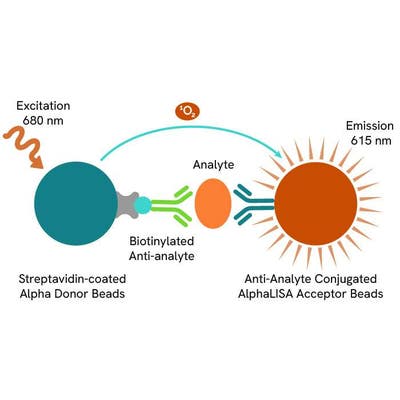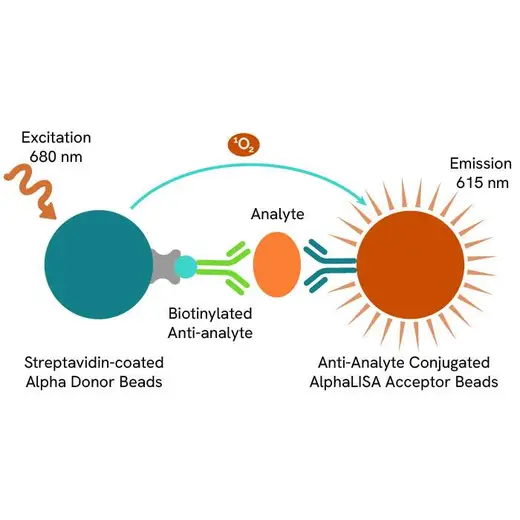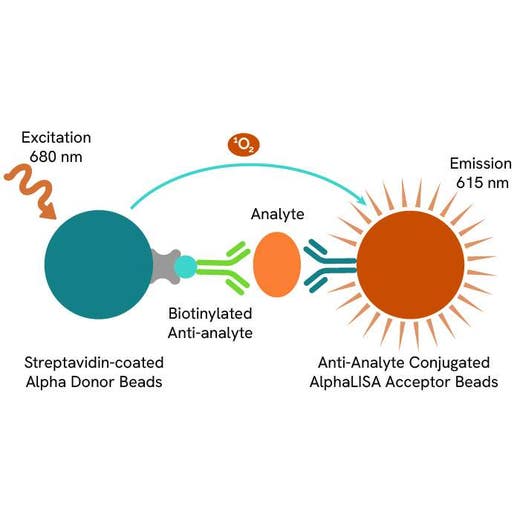
AlphaLISA HEK 293 HCP Detection Kit, 100 Assay Points

AlphaLISA HEK 293 HCP Detection Kit, 100 Assay Points




The AlphaLISA™ immunoassay kit for HEK 293 Host Cell Protein (HCP) Detection enables the quantitative determination of HEK 293 HCP in cell culture media, and cell supernatants using a homogeneous AlphaLISA assay (no wash steps).
| Feature | Specification |
|---|---|
| Application | Protein Quantification |
| Dynamic Range | 0.302 - 1,000 ng/mL |
| Limit of Detection | 0.302 ng/mL |
| Limit of Quantification | 1.013 ng/mL |
| Sample Volume | 5 µL |
The AlphaLISA™ immunoassay kit for HEK 293 Host Cell Protein (HCP) Detection enables the quantitative determination of HEK 293 HCP in cell culture media, and cell supernatants using a homogeneous AlphaLISA assay (no wash steps).


AlphaLISA HEK 293 HCP Detection Kit, 100 Assay Points


AlphaLISA HEK 293 HCP Detection Kit, 100 Assay Points


Product information
Overview
Human Embryonic Kidney (HEK) 293 is a cell line commonly used for research and biopharmaceutical production. The HEK Host Cell Proteins (HCP) kit is designed to measure contaminants originating from the HEK cells used to manufacture therapeutic antibodies. This kit can be utilized to quantify HEK HCP proteins at various stages, from routine bioprocess operations to crude harvest materials to final products. Our simple procedure and robust assay offer increased throughput compared to ELISA.
Formats
- Our 100 assay point kit allows you to run 100 wells in 96-well format, using a 50 µL reaction volume (5 µL of sample).
- Our 500 assay point kit allows you to run 500 wells in 96-well or 384-well format, using a 50 µL reaction volume (5 µL of sample).
- Our 5,000 assay point kit allows you to run 5,000 wells in 96-well or 384-well format, using a 50 µL reaction volume (5 µL of sample).
Features
- No-wash steps, no separation steps
- ELISA alternative technology
- Sensitive detection
- Broad sample compatibility
- Small sample volume
- Results in less than 4 hours
- Half the time of an ELISA assay
AlphaLISA technology allows the detection of molecules of interest in a no-wash, highly sensitive, quantitative assay. In an AlphaLISA assay, a biotinylated anti-analyte antibody binds to the Streptavidin-coated Donor beads while another anti-analyte antibody is conjugated to AlphaLISA Acceptor beads. In the presence of the analyte, the beads come into close proximity. The excitation of the Donor beads causes the release of singlet oxygen molecules that triggers a cascade of energy transfer in the Acceptor beads, resulting in a sharp peak of light emission at 615 nm.
Specifications
| Application |
Protein Quantification
|
|---|---|
| Automation Compatible |
Yes
|
| Brand |
AlphaLISA
|
| Detection Modality |
Alpha
|
| Dynamic Range |
0.302 - 1,000 ng/mL
|
| Limit of Detection |
0.302 ng/mL
|
| Limit of Quantification |
1.013 ng/mL
|
| Product Group |
Kit
|
| Sample Volume |
5 µL
|
| Shipping Conditions |
Shipped in Blue Ice
|
| Target |
HEK 293 Host Cell Protein
|
| Target Class |
Biomarkers
|
| Technology |
Alpha
|
| Unit Size |
100 assay points
|
Resources
Are you looking for resources, click on the resource type to explore further.
Unlock the future of therapeutics with multispecific antibodies
Discover the groundbreaking advancements in multispecific antibody...
Helping you put safety and product efficacy at the forefront of your GMP manufacturing
At Revvity we’re able to support your GMP...
Human Embryonic Kidney (HEK) 293 cells are commonly used in the expression and production of therapeutic proteins and viruses for...


How can we help you?
We are here to answer your questions.






























